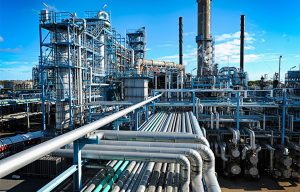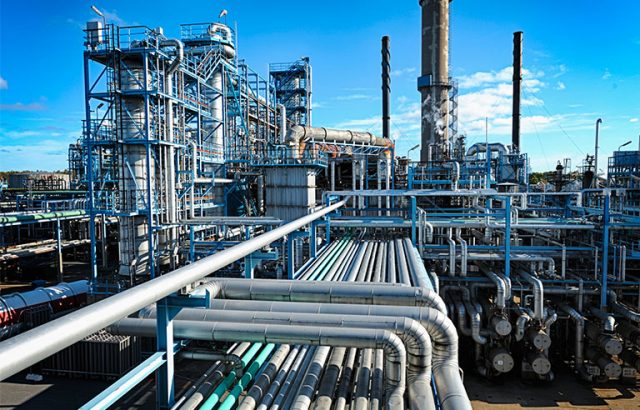… the way out is Modular refineries
Thomas Jefferson, the principal author of the Declaration of Independence in 1776 and the third President of the United States once said that ‘’ Honesty is the first chapter in the book of wisdom.” It has been said that the currency of leadership is transparency. We have found ourselves again in the conundrum of subsidy because the sector has been hooded in clandestine operations. For a long time now we have been jaded with the same old storyline of petroleum products importation rather than refining locally. With more questions, resolutions can only be found in the realm of self-examination and ethics which apparently, may be lacking in most privileged Nigerians in positions of authority. For venal reasons they develop corrupt tendencies which make them inefficient on the job. Corruption kills productivity in any system.
Oil refining as an essential part of the downstream side of the petroleum industry is not different from what chemistry students may refer to as separation techniques of a solution into constituents’ products. When heated at varying degrees from 90-1000 degrees (F) the following products can be recovered; high-octane motor fuel (gasoline/petrol), diesel oil, liquefied petroleum gases (LPG), jet aircraft fuel, kerosene, heating fuel oils, lubricating oils, asphalt and petroleum coke. It is a factory where crude oil is transformed into petrol and hundreds of other useful products as mentioned above. It comes in various sizes. The range from small topping and reforming refineries to sophisticated complex refineries, but perform three basic steps which are Separation (fractional distillation), Conversion (cracking and rearranging the molecules), and Treatment. A typical large [conventional] refinery costs billions of pounds to build and millions more to run and upgrade. It runs around the clock 365 days a year, employs hundreds of people and occupies as much land as several hundred football pitches.
History has shown in Nigeria that large scale, full service plants are difficult to maintain and often function at the level of small scale modular plants anyway, despite their size and heavy output potential. The Port Harcourt, Warri and Kaduna plants have been almost non-functional due to a poor maintenance culture and the profound difficulty of Nigeria.in sustaining the industrial ethics needed for large scale refining. While it is encouraging that the 500,000 BPD plant by Dangote will alleviate the national and regional shortages in petroleum products supply, it should be understood that the problems that crippled the older plants are still in place, and by the sheer size of the refinery, it may suffer the fate of the older ones if extensive reforms are not implemented.
Again comes the question of insincerity and corruption of leaders. As a matter of indices, when we refine a barrel of crude oil of 42 gallons or 159 litres, we get products as follows: gasoline or PMS (19.4 gallons or about 73 litres which is about 47 percent), Kerosene or Jet fuel (10 percent), diesel and heating oil (23 percent), propane 4 percent, asphalt 3 percent, other products (petrochemical feedstock derived from manufacturing of chemicals Synthetic rubber and plastics) 18 percent. It gives 105 percent because there is always 5 percent refining gains. If our four refineries were functioning, the 445,000 barrels which they claim they refine, would give us 209,150 barrels which translates to 33,000,000 litres of gasoline or PMS. One knows that we do not consume more than 35 million litres per day. So who is fooling who here.
A modular refinery as the name implies, is a refinery whose parts or equipment are constructed in modules designed to be transported quickly and easily anywhere in the world and comes in a variety of sizes with capacities that range from 500 to 20,000 barrels per day. Mini Refineries are ideally suited for remote locations, rapid production of primary fuels (for consumption) and raw materials or feed (for the petrochemical industries) and greater process flexibility. Again, it takes Limited refinery project land space, minimal installation cost, and has quicker investment recovery. It is said that Two operators can restart the plant from a cold start and have the plant in full operation in a matter of hours. It is completely automated and once an operator sets all the controlling points, all product temperatures and flows can be controlled automatically. Only a flat support area or concrete slab without anchor bolts is required to support the plant. Fuel supply can be natural gas, naphtha, diesel, fuel oil or a combination of these fuels.
Modular refineries however offer some unique options that may be more suitable for emerging economies like Nigeria. Due to its manageability, it is in my opinion better suited for the Nigerian environment. Its key advantage lies in its size, cost differential and flexibility. It is constructed in a controlled environment and properly tested before being shipped out. It is relatively easier to fabricate and erect. Also, when an area becomes unsuitable for business, it can be disassembled and reassembled in a more suitable environment. For areas with non-cohesive geopolitics like Nigeria, modular plants can be scattered throughout the country to each serve the needs of the various regions of the country. The maintenance cost is low; considering that it processes 2,000 to 20,000 BPD of mainly light sweet crude, routine turn around maintenance and on-stream inspections would require less personnel and down time. Modular plants are easier to secure because of the reduced surface area and perimeter; issues of internal monitoring of equipment and external acts of sabotage can be better policed given the smaller area of operation, and in a situation where one plant suffers an incident, the other smaller plants scattered all over the country can still be operational. The impact on the environment is nothing compared to a large scale refinery.
While it may take several years to build a large refinery, modular plants can be put to service in a matter of months, and only cost about 250 million dollars
As of 2015, the following net importers of petroleum have refineries in this order: China (51 refining 12.6 mbpd) Japan (29 refining 4.1 mbpd), India (21 refining 4.3 mbpd), Germany (15 refining 2.1 mbpd), France (13 refining 1.5 mbpd), Italy (16 refining 2.1 mbpd) and South Korea (6 refining 2.9 mbpd). The United States only imports crude to augment the shortfall for her 139 functional refineries refining 17.8 mbpd to keep their economy going. The US does not import refined products. They derive the full benefits of petroleum by refining their products locally. Nigeria is among the top fifteen world producers of petroleum. Incidentally, Nigeria is the only one that exports all her crude and imports virtually all her refined products and their derivatives. This is the reason we place our budget bench mark on the sale of crude in the international market. We sell a barrel of crude for less than $60 and buy all the by-products and derivatives for as much as $3000.
It is on record that India as a net importer of petroleum has the world’s largest refinery (Jamnagar Refinery Gujurat) with about 1.24 million barrels per day capacity. China with a population of 1.3 billion people meets her domestic demand and also exports to other regions. The Organisation of Petroleum Exporting Countries (OPEC) has refineries in this order: Saudi Arabia (10 refining 2.5 million barrels per day), Iran (9 refining 1.7 mbpd), UAE (4 refining 0.7 mbpd), Kuwait (3 refining 0.91 mbpd), Venezuela (12 refining 1.8 mbpd), Iraq (11 refining 0.83 mbpd), Algeria (5 refining 0.65 mbpd), Angola (2 refining 0.04mbpd), Libya (5 refining 0.38 mbpd), Qatar (3 refining 0.14 mbpd), and Ecuador (2 refining 0.19mbpd). All their refineries are working and meet their requirements and for export. This is the Nigerian case. Nigeria has four refineries, two in Port Harcourt (1st P/H 60,000 bpd and 2nd P/H 150,000bpd), and one in Warri (125,000 bpd) and one in Kaduna (110,000 bpd) with a combined refining capacity of 445,000 barrels per day. The oldest in Port Harcourt was built in 1965 and the newest still in Port Harcourt was built in 1989. Warri and Kaduna came on stream in 1978 and 1980 respectively, they have for almost two decades been down due to inadequate maintenance. It has been gory tales of turn around maintenance (TAM) with millions of dollars wasted at regular intervals in our harvests of misfortune. Today, we are talking about local importers or marketers holding us to ransom as to how and when we get products supply. Tomorrow we may be talking about international petroleum products suppliers refusing us supplies. One can imagine the confusion in our national life and psyche. The Digboi Refinery in Assam, India reputed to be the oldest in the world, built in 1901 is still functioning till today so what is wrong with this country? It is more pathetic to note that President Buhari who is very familiar with this terrain watches as Nigeria languish in this crude oil enigma spending trillions on importation, oil marketers, and subsidies. Once upon a time Nigerians were hoodwinked by this administration that subsidy is the corruption brought in by PDP. They deceived Nigerians to their votes. All of a sudden the fuel price was hiked to 145 naira to seal off the subsidy. Now subsidy has materialized again to the extent of gulping a princely sum of N1. 149, 385 trillion estimated to go into the payment of subsidy on petrol imported into the country this year thus implying the sum of N3.149b per day. NNPC informed that the landing cost of petrol in the country currently is N207.98. This implies that government currently pays N62.98 subsidy per litre of petrol.The Nigeria National Petroleum Corporation (NNPC), which has since deployed subsidy as part of its operational costs, as the last resort of supply line as enshrined in the NNPC Act 1977, defrays an estimated N3.149b per day. The Group Managing Director of NNPC, Dr. Maikanti Baru, last year said that the country’s daily consumption of petrol was 50 million litres.
Is a high time we came to our senses as a nation. We have spent so much on subsidies and petroleum importation, more than needed to build refineries that would satisfy our local needs and position us as net exporters of refined products. We are spending a very huge part of our foreign exchange on petroleum imports which puts undue pressure on our foreign currency reserves and the value of our naira. Again, we are exporting jobs to those countries that sell refined petroleum to us, as well as missing the companies’ income tax that would have been due from local refining as well as the personal income tax from individuals the refineries would have employed. Furthermore, the nation makes itself vulnerable to being shut down through the activities of marketers or any disruption of the oil import system.
I strongly believe that the problem of Nigeria lies with the leaders. There is a solution to all these as enumerated above. Let’s run with mini refineries strategically cited across the federation to serve the need of the immediate environment. This will safe cost for Nigeria to maintain the four big refineries, create more employment and assure stability of the economy through diversification hence strengthening the value of the crashing naira.











